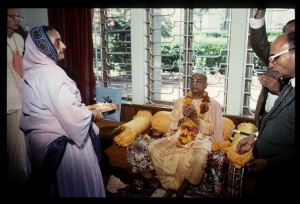CC Madhya 17.132 (1975)

A.C. Bhaktivedanta Swami Prabhupada
TEXT 132
- deha-dehīra, nāma-nāmīra kṛṣṇe nāhi 'bheda'
- jīvera dharma--nāma-deha-svarūpe 'vibheda'
SYNONYMS
deha-dehīra—of the body and the owner of the body; nāma-nāmīra—of the name and the owner of the name; kṛṣṇe—in Kṛṣṇa; nāhi bheda—there is no difference; jīvera dharma—the situation of the conditioned soul; nāma—name; deha—body; sva-rūpe—original form; vibheda—different.
TRANSLATION
"There is no difference between Kṛṣṇa's body and Himself or between His name and Himself. As far as the conditioned soul is concerned, everything is different. One's name is different from the body, from one's original form and so on.
PURPORT
Śrī Caitanya Mahāprabhu is herein pointing out to the brāhmaṇa that Māyāvādī philosophers cannot understand that the living entity is equal in quality with the Supreme Personality of Godhead. Because they do not accept this, they think that the living entity has been falsely divided from the original Brahman due to being conditioned by māyā. Māyāvādīs believe that the Absolute Truth is ultimately impersonal. When an incarnation of God or God Himself comes, they think He is covered by māyā. In other words, Māyāvādī impersonalists think that the Lord's form is also a product of this material world. Due to a poor fund of knowledge, they cannot understand that Kṛṣṇa has no body separate from Himself. His body and Himself are both the same Absolute Truth. Not having perfect knowledge of Kṛṣṇa, such impersonalists certainly commit offenses at His lotus feet. Therefore they do not utter the original name of the Absolute Truth, Kṛṣṇa. In their impersonal way, they utter the name of impersonal Brahman, spirit soul. In other words, they indulge in indirect indications of the Absolute Truth. Even if they happen to utter the name of Govinda, Kṛṣṇa or Mādhava, they still cannot understand that these names are as good as Govinda, Kṛṣṇa or Mādhava the person. Because they are ultimately impersonalists, their uttering of the personal name has no potency. Actually they do not believe in Kṛṣṇa but consider all these names to be material vibrations. Not being able to appreciate the holy name of the Lord, they simply utter indirect names like Brahman, ātmā and caitanya.
It is a fact, however, that the name of Kṛṣṇa and Kṛṣṇa the person are both spiritual. Everything about Kṛṣṇa is transcendental, blissful and objective. For a conditioned soul, the body is different from the soul, and the name given by the father is also different from the soul. The conditioned living entity's identification with material objects keeps him from attaining his actual position. Although he is an eternal servant of Kṛṣṇa, he acts differently. The svarūpa, or actual identification of the living entity, is described by Śrī Caitanya Mahāprabhu as jīvera 'svarūpa' haya-kṛṣṇera 'nitya-dāsa'. The conditioned soul has forgotten the real activities of his original position. However, this is not the case with Kṛṣṇa. Kṛṣṇa's name and His person are identical. There is no such thing as māyā Kṛṣṇa because Kṛṣṇa is not a product of the material creation. There is no difference between Kṛṣṇa's body and His soul. Kṛṣṇa is simultaneously both soul and body. The distinction between body and soul applies to conditioned souls. The body of the conditioned soul is different from the soul, and the conditioned soul's name is different from his body. One may be named Mr. John, but if we call for Mr. John, Mr. John may never actually appear. However, if we utter the holy name of Kṛṣṇa, Kṛṣṇa is immediately present on our tongue. In the Padma Purāṇa, Kṛṣṇa says, mad-bhaktā yatra gāyanti tatra tiṣṭhāmi nārada: "O Nārada, I am present wherever My devotees are chanting." When the devotees chant the holy name of Kṛṣṇa-Hare Kṛṣṇa, Hare Kṛṣṇa, Kṛṣṇa Kṛṣṇa, Hare Hare Hare Rāma, Hare Rāma, Rāma Rāma, Hare Hare-Lord Kṛṣṇa is immediately present.